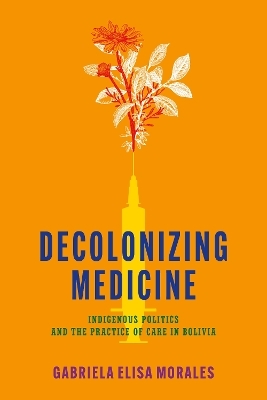
Decolonizing Medicine
Indigenous Politics and the Practice of Care in Bolivia
Seiten
2025
Stanford University Press (Verlag)
978-1-5036-4085-6 (ISBN)
Stanford University Press (Verlag)
978-1-5036-4085-6 (ISBN)
- Noch nicht erschienen (ca. Mai 2025)
- Versandkostenfrei innerhalb Deutschlands
- Auch auf Rechnung
- Verfügbarkeit in der Filiale vor Ort prüfen
- Artikel merken
Decolonizing Medicine examines Bolivian state-led efforts to decolonize health services during the administration of Evo Morales, Bolivia's first Indigenous president. Governing from 2006 to 2019, the Morales administration undertook sweeping reforms, vowing to reverse intertwined colonial and capitalist systems of oppression and restore Indigenous good living. Predating more recent calls from global health practitioners to "decolonize global health," Bolivian state projects included a range of initiatives, such as integrating Indigenous traditional medical practitioners into clinical care and encouraging cultural sensitivity among healthcare providers. And yet, despite layered institutional investments, many Indigenous patients continued to describe their local hospital as a place "donde no hay atención" ("where there is no care").
Through fine-grained ethnography of health policymaking and implementation, Gabriela Elisa Morales tracks how Bolivian biomedical and public health institutions fell short of the far-reaching transformations proposed by decolonial activists and theorists. At the same time, she foregrounds how Indigenous patients and healers challenged the terms of caregiving and demanded that state and medical institutions fulfill their obligations to Indigenous flourishing. In tracing these dynamics, Morales articulates the multiplicity of ways that care practice becomes a locus of political foreclosure as well as radical transformation, with crucial insights for broader projects of decolonization and Indigenous rights.
Through fine-grained ethnography of health policymaking and implementation, Gabriela Elisa Morales tracks how Bolivian biomedical and public health institutions fell short of the far-reaching transformations proposed by decolonial activists and theorists. At the same time, she foregrounds how Indigenous patients and healers challenged the terms of caregiving and demanded that state and medical institutions fulfill their obligations to Indigenous flourishing. In tracing these dynamics, Morales articulates the multiplicity of ways that care practice becomes a locus of political foreclosure as well as radical transformation, with crucial insights for broader projects of decolonization and Indigenous rights.
Gabriela Morales is Associate Professor of Anthropology at Scripps College.
| Erscheint lt. Verlag | 6.5.2025 |
|---|---|
| Zusatzinfo | 9 halftones, 1 map |
| Verlagsort | Palo Alto |
| Sprache | englisch |
| Maße | 152 x 229 mm |
| Themenwelt | Medizin / Pharmazie ► Gesundheitswesen |
| Sozialwissenschaften ► Ethnologie | |
| Sozialwissenschaften ► Soziologie | |
| ISBN-10 | 1-5036-4085-X / 150364085X |
| ISBN-13 | 978-1-5036-4085-6 / 9781503640856 |
| Zustand | Neuware |
| Haben Sie eine Frage zum Produkt? |
Mehr entdecken
aus dem Bereich
aus dem Bereich
Grundlagen, Umsetzung, praktische Hilfen
Buch | Softcover (2024)
Kohlhammer (Verlag)
39,00 €
Eine Einführung in Struktur und Funktionsweise
Buch | Hardcover (2021)
Hogrefe AG (Verlag)
38,00 €
Vielfältige Perspektiven für einen konstruktiven Dialog
Buch | Softcover (2022)
Versus (Verlag)
35,00 €


